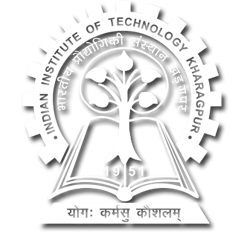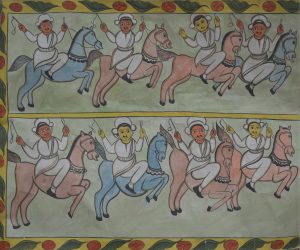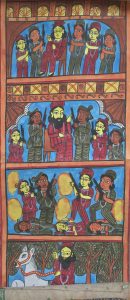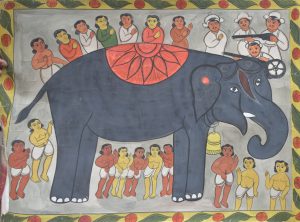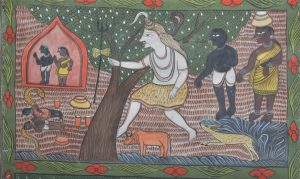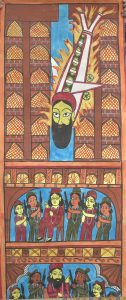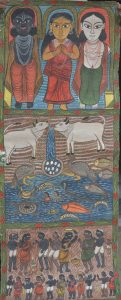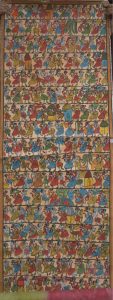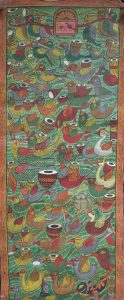Transcript
Interviewer (AM): Kindly introduce yourself.
Dulal Chitrakar: My name is Dulal Chitrakar.
The name of my village is Naya; post office is also Naya; police station is Pingla.
Interviewer (AM): If you could kindly tell us about your childhood…
(misunderstands) Dulal Chitrakar: My sons are also patuas.
I have got seven sons, and all of them practice patachitra.
Interviewer (AM): We would like to know about your childhood.
How and when did you move to Naya?
Dulal Chitrakar: I used to make clay idols of deities.
I practiced patachitra, too.
But patachitra was not a popular art form back then.
It was only with the help of the government and banglanatak.com that the state of patachitra improved.
Nowadays, I make clay figurines only when I have ample time at hand.
Otherwise, I practice patachitra.
Yes, by and large, I work on patachitra these days.
The fair (Potmaya) is about to be held in a few days from now.
So, I am a bit busy these days.
Also, Kali Puja would be celebrated this month.
I have made a few idols and would put them up for sale at the fair.
My sons also practice patachitra.
Interviewer (AM): Okay.
When did you move to this place?
Dulal Chitrakar: It’s been fifty-five to sixty years since I moved here.
Less than sixty years.
Interviewer (AM): Okay.
Have you been staying here since your childhood?
Dulal Chitrakar: Yes, since childhood.
My father and my grandfather also practiced patachitra.
Interviewer (AM): Okay.
Dulal Chitrakar: They were also patuas.
However, they made idols as well.
During those days, patachitra was not this popular.
They wandered around villages, begging for alms.
That is how they earned their living.
It was a hand-to-mouth living.
But now, things have improved.
People at least earn enough to get by.
Nowadays, people have abandoned the practice of making clay idols.
They have started composing patas.
We have also started doing the same.
We have been practising patachitra since the time of my father and grandfather.
Patachitra is inseparably entwined with the existence of a patua.
It is almost like our umbilical cord.
It’s been with us since birth.
Even till this date, I am practising patachitra.
I have seven sons, and all of them are also doing the same.
They live in adjacent houses.
I have told them to build these houses so that we can stay together.
As long as I can, I will keep practising patachitra.
After that, they can continue with this tradition.
My native place was Haldia.
There are places like Akubpur, Chaitanyapur where one can find patua settlements.
Understood? I migrated almost fifty-five to sixty years back.
Yes, less than sixty years.
It won’t be more than sixty years.
Even there, we used to practice patachitra.
My uncle, Rajanikanta Chitrakar had received the Rashtrapati Award for his pata.
My father and grandfather usually made clay idols.
In comparison, patachitra was practiced less.
Since, patachitra was not that popular back then,
they had to engage in a lot of other work in order to be able to earn a living.
I have worked as a rickshaw puller as well.
What else could I have done? Patachitra was not enough to feed myself.
Therefore, I had to work as a rickshaw-puller.
What can a person do when he is battling abject poverty and not earning enough to feed his/her family?
Even my son worked as a rickshaw-puller.. But now, he doesn’t pull rickshaws anymore.
He has left that job and has started composing patachitras.
Interviewer (AM): Okay.
All your seven sons…
Dulal Chitrakar: All of them compose patas.
I don’t have a daughter.. I have seven sons.
Interviewer (AM): Okay. That’s nice.
How old is your eldest son?
Dulal Chitrakar: He is around fifty-five.
yes, around fifty-five.
Interviewer (AM): How old are you?
Dulal Chitrakar: I am around seventy.
Interviewer (AM): Okay.
We got to know that there are some patuas living in Purba. Medinipur as well.
Dulal Chitrakar: Yes.
There are patuas there.
Interviewer (AM): So, have people from Naya (Paschim Medinipur) migrated to. Purba Medinipur or …
Dulal Chitrakar: No, people from Purba Medinipur have migrated to this place.
They have moved from there to settle down here.
Yes, from there to here.
Not the other way round.
This is a pretty recent settlement.
People (in fact, all of them) have come from various places.
We have people from Nandigram, from Rashpur –
people from all several places have come and settled here.
Interviewer (AM): Okay.
Dulal Chitrakar: There also you’ll find a few patuas in Hanshchawra.
Purba Medinipur’s Hanshchawra.
There are patuas living there as well.
There’s a research centre over there.
They also practice patachitra.
But we are all related to each other.
Interviewer (AM): How?
Dulal Chitrakar: Some of them are our relatives.
We have been sharing this relationship since generations.
They visit us; we visit them.
Interviewer (AM): How many patua families were present, when you first moved to this place?
Dulal Chitrakar: No, there weren’t many patua families living here at that time.
No, there weren’t many families.. One, two, three…just three families.
Initially there were just three families, and then I moved here.
Understood? After that, I settled here.
From those three families, the number has multiplied and now we have such a huge population.
Generation after generation, patuas have settled down here and I guess we have around a hundred families now.
Now that patuas have been living here for generations, the figure must have reached hundred.
I myself have six sons.
We are a family of eight people living here – my sons, my wife and me.
Now every family has two to four children.
The number has multiplied and now the figure has gone up to sixty or perhaps hundred.
Moreover, some sons-in-law are moving to this place.
In a few families, the sons in law are staying back here.
That is how the number is increasing.
It is becoming increasingly difficult to find a piece of vacant land here.
Interviewer (AM): Right.
Dulal Chitrakar: No vacant land is available.
Plot rates have soared by leaps and bounds.
It’s not available.
Despite being willing to pay a hefty sum, people are finding it difficult to get vacant plots.
What more can I say? This is how the situation is.
Interviewer (SA): This is a newly constructed house. Right?
Dulal Chitrakar: Yes.
Interviewer (SA): How old is this house?
Dulal Chitrakar:Which one? This house?
Interviewer (SA): Yes.
Dulal Chitrakar: Around six to seven months.
Interviewer (AM): Okay.
Where did you stay earlier?. Did you stay in this area?
Dulal Chitrakar: Yes, I lived in this house.
I have another house adjacent to this.
But it has water drainage issues.
I’m finding it difficult there.. My sons have built this house for me.
I have contributed as well.
After all, we have to survive.. Everyone wants to stay alive.
Does anyone want to die? No one does.
Everyone wants to live.
My sons wanted to construct the entire house.
But why would want them to pity me? That is why I have built this on my own.
Later (after my demise), they can do whatever they want to.
If they want to demolish the entire structure and take out the bricks, they can do that as well.
I won’t be here to witness these.
Isn’t it true?
I intend to complete the construction before the fair (Potmaya).
Usually people come over and put up at my place during those days.
I am trying my best to complete this before that. Let’s see what happens.
It would be nice if the construction could be completed because people stay here during those days.
Interviewer (AM): Okay.
Let’s talk about your patachitra now.
What are the typical themes of your pata? What do you usually paint on?
Dulal Chitrakar: You see… there are various types of patas.
Some patas are based on contemporary, social incidents.
There are patas that tell mythological tales like that of King Harishchandra, goddess Manasa, the Ramayana etc.
These themes are ancient and ancient things have an aura of their own.
Ancient things are respected.
Nowadays, there are several patas based on contemporary topics.
Even the government is asking us to compose patas on particular themes like pulse-polio and other topics like…
Interviewer (AM): Afforestation
Dulal Chitrakar: Yes, on afforestation.
There are several other themes on which we have been asked by the government to compose patas.
We have composed several patas and pata songs.
I have repeatedly listened to the pata songs that have been
composed by other patuas and finally have painted a pata accordingly.
Interviewer (AM): Did you decide the themes for patachitra all by yourself earlier?
Dulal Chitrakar: Yes, all by ourselves.
Interviewer (AM): But nowadays, you are receiving requests to compose patas on certain themes.
Dulal Chitrakar: Yes, we are receiving such requests, where we are being told on what themes we are supposed to compose on.
Interviewer (AM): So, don’t you think that…
Dulal Chitrakar: When a natural calamity like a tsunami takes place, we try portraying that in our patas as well.
Interviewer (AM): Okay.
Dulal Chitrakar: Do you get my point? We try portraying these as well.
We compose patas on government policies like the Kanyashree,. Yuvashree.
Interviewer (AM): Okay.
Which pata is more popular –
the mythological ones or the ones based on social incidents?
Dulal Chitrakar: No matter how many patas are composed on contemporary events,
the age-old mythological ones would never lose their value.
They are always in demand.
The old mythological patas have still retained their repute.
Even if there may be several patas on contemporary issues.
Some of them are quite appealing as well.
But even then, the mythological ones will still remain the more popular ones.
This would never die out.
Interviewer (AM): Okay.
Which of these patas is usually longer?
Dulal Chitrakar: Oh, longer? The Ramayana.
Interviewer (AM): So, the mythological ones are longer.
Dulal Chitrakar: Yes, of course.
A scroll depicting all the seven episodes of the Ramayana would definitely be very long.
A single scroll depicting the Ramayana costs around eighty to ninety thousand.
One such scroll got sold at one lakh rupees.
Interviewer (AM): That’s incredible!
Dulal Chitrakar: Of course! I have myself sold it for one lakh rupees.
Be it eighty or ninety thousand…that’s almost one lakh rupees.
The person buying the scroll would resell it.
Interviewer (AM): Yes, yes.
Do you get my point? S/he would try to buy a scroll from the artist with a meager amount.
S/he would then resell it at a much higher rate.
Basically the same scroll would reach a customer via a middle man.
Once a middle man enters the scenario, the prices obviously increase.
So, when a patua sells a pata at eighty or ninety thousand rupees,
it means that the same pata will definitely be sold at least at one lakh rupees.
Interviewer (AM): How long does it take to compose these patas?
Dulal Chitrakar: It takes months after months to compose patas.
Interviewer (AM): How long does it take to compose a single scroll?
Dulal Chitrakar: One cannot work at a stretch.
A patua might work for a few hours in the evening, and a few more hours in late evening.
S/he might again work on the following morning.
They might even take a day off in between.
Basically, it’s not possible to work at a stretch.
If one were to work continuously, s/he would lose interest.
S/he won’t be in the mood for work.
In order to compose a beautiful pata, one has to invest time and patience.
Oh! It’s finally sunny.
Interviewer (AM): How dense is the population now?
Dulal Chitrakar: As I have already mentioned, it’s quite densely populated.
Interviewer (AM): So, the patas that are composed by the patuas here are all more or less similar.
Dulal Chitrakar: Yes, nowadays, patachitra is being composed on cloth, shoes,
dupattas, salwar kameez, kurtas, kurtis, caps and innumerable other stuff.
In order to feed oneself, one has to direct his attention to his earnings.
Composing on scrolls has declined while the practice of composing patas on cloth has risen.
Interviewer (AM): Okay.
Depending on how well a patua composes a pata does s/he…
Dulal Chitrakar: The best work? Listen…recently some patuas have started following the Kalighat style.
There’s a patua called Anwar Chitrakar.
He composes really nice patas.
Also, my youngest son composes beautiful patas.
In my opinion, Anwar would rank first, followed by my son.
There are several others as well.
But then, there’s another patua – one of Dukhushyam’s sons… he is also a good artist.
Their painting styles are pretty unique.
Interviewer (AM): We have spoken to Anwar Chitrakar as well.
His painting style is indeed quite unique.
Dulal Chitrakar: Yes, he works really well.
He follows the Kalighat style of painting.
Even my son follows the same style.
He stays one building away.
Interviewer (AM): While composing patas, how much of the work is done individually and how much of it is done collectively?
Dulal Chitrakar: We work collectively only when we are assigned some project by the centre.
Otherwise, we work as individuals.
Interviewer (AM): Okay.
When a pata is sent for an exhibition, does the entire community get acknowledged
or does the individual identity of the artist get the limelight?
Dulal Chitrakar: The name of the village will obviously be mentioned.
Won’t you have to mention the name of the village and the police station?
It’s obvious that you have to!. No matter where a pata is being sent,
the name of the village and the police station has to be mentioned.
It ought to be mentioned by the patua himself/herself.
You obviously have to mention it.
Acknowledging the name of one’s village is a matter of pride.
All the artists here have glorified the name of the village.
Yes, we are the pride of our locality.
Interviewer (AM): A lot of NGOs come forward to help you…
Dulal Chitrakar: Yes, we have received help from NGOs.
For example, we have received help from the NGO banglanatak.com.
Yes, then we have another NGO – Khadi.
Interviewer (AM): Khadi.
What sort of help do you usually receive from them?
Dulal Chitrakar: These NGOs help us financially.
They sponsor the Potmaya.
Interviewer (AM): Okay.. How does that help you?
Dulal Chitrakar: They contribute a decent amount to the Potmaya funds.
They donate around two to three lakhs.
Some other NGOs also contribute to the fund.
banglanatak.com provides us with financial aid.
It visits us and also cooperates with us.
Interviewer (AM): Has anyone/NGO ever given you an offer and then revoked it?
Dulal Chitrakar: No, I have personally never received any such offer.
If they provide us with any such offer, they’ll offer it to the artists as a group.
They wouldn’t provide such offers separately to individuals.
Interviewer (AM): One more question.
From what we gathered, it seems that most of the patuas living here are followers of the Islamic faith.
Dulal Chitrakar: Yes, all the patuas here are followers of the Islamic faith.
But they paint.
Interviewer (AM): Pardon.
Dulal Chitrakar: But they paint.
Listen… we love both Hindus and Muslims.
But we paint Hindu deities.
We love them but we practice the Islamic faith.
We don’t discriminate against each other.
We haven’t created any barriers amongst ourselves on religious grounds.
Interviewer (AM): Okay.
So, has there been any pressure created from any quarters regarding this?
Have you ever experienced any such thing since your childhood?
Dulal Chitrakar: No, no one ever created any pressure or impeded our work.
Why would I lie and say something like that?
Interviewer (AM): Nothing on religious grounds?
Dulal Chitrakar: No, no.
Incidents like these occurred earlier.
Earlier, orthodox people used to create such pressure.
Interviewer (AM): If you could kindly throw some light on that…
Dulal Chitrakar: They did all such things.
They commented on our religious beliefs.
But those things happened long back.
Nowadays, you won’t find anyone discriminating like this.
People who used to comment that way didn’t have much exposure. They had a very narrow world view.
They were all rural people.
They were rural in the sense that they didn’t travel much;
they had no exposure to the outer world and had a very shallow perspective.
Do you get my point? That is why they said all these things.
But now you won’t find people saying such things.
Interviewer (AM): Suppose, an outbreak of communal violence occurs in West. Bengal, how would you react to that?
Dulal Chitrakar: Oh! You mean if a communal riot takes place?
Interviewer (AM): Yes, what if a communal riot takes place?
Dulal Chitrakar: You see…we’ll remain the same.
What else would we do? Even if there’s an outbreak of communal violence,
we’ll keep practising patachitra.
This is what we have always done and this is what we’ll keep doing.
Interviewer (AM): But you all have Hindu names.
Dulal Chitrakar: Yes, we have always had such names.
Interviewer (SA): You even wear rings like the Hindus do.
Dulal Chitrakar: Yes.
Even our children have Hindu names.
There are people named Uttam, Rubin, Swapno – they all have. Hindu names.
There’s no distinction between Hindus and Muslims, then.
Apparently, we have religious differences.
But we have such names.
This is the only difference.
We follow the Islamic tradition.
That is all.
Interviewer (AM): Does this help you in any way?
Dulal Chitrakar: What? The Islamic faith?
Interviewer (AM): This practice of adopting Hindu names.
Dulal Chitrakar: You see… this is what our forefathers used to practice.
Interviewer (AM): Was there any particular reason? Did any form discrimination exist, back then?
Dulal Chitrakar: What do you mean by that? We have always been known by such names.
We are simply following the footsteps of our forefathers and our acquaintances.
We have embraced the Islamic faith.
We follow the Islamic religious tradition.
But we compose patachitras, we paint, and also make clay idols.
Interviewer (AM): You don’t dwell on matters of religion, while working?
Dulal Chitrakar: You see… there’s a saying that your religion is the work that you do.
If you keep doing your work, then there’s nothing greater than that. So, keep doing your duty.
Work should never be discriminated against.. Even a manual scavenger has to do his duties.
He, too, has to make a living.
There’s no hierarchy in work. No work is petty or low.
This is what I personally believe.
No work can be labeled as low.
We work hard and earn our bread.. We are not officers, having white collar jobs.
We’ll keep working this hard and earn our livelihood.
Interviewer (AM): What are the places you have been to?. I mean apart from this village.
You lived in Purba Medinipur. Right?
Dulal Chitrakar: Yes.
The place where I used to live earlier is in the district of Purba Medinipur
and this is Paschim Medinipur.
Interviewer (AM): Before that?
Dulal Chitrakar: Before that, as a child, I used to live in Purba. Medinipur.
Interviewer (AM): Have you visited other places and displayed your patas?
Dulal Chitrakar: I have visited Delhi but other than that I haven’t travelled much.
I’ll be honest. I haven’t travelled far and wide.
I have visited Kolkata and Delhi.
My sons have been to several places.
But I am too old to travel to distant places.
Interviewer (AM): Where have they been?
Dulal Chitrakar: Me?
Interviewer (AM): Them. I mean your sons.
Dulal Chitrakar: They have been to Bombay (Mumbai), Delhi.
My daughters-in-law have visited foreign countries.
Interviewer (AM): Oh!
My daughters-in-law have visited foreign countries.
banglanatak.com helps the patuas visit foreign countries and display their work.
They were accompanied by members from the banglanatak.com.
The NGO?
Dulal Chitrakar: Yes, the NGO.
Interviewer (AM): You mentioned that all your sons practice patachitra.
Suppose your sons or someone else from the next generation comes up
and expresses an interest for a different profession, how would you react to that?
Dulal Chitrakar: Let me tell you one thing then.
There are people from the next generation who have abandoned this profession
and taken up a job at a cement factory or at a carpentry shop.
So, there are people who have already abandoned this profession.
They don’t like working as patuas.
Moreover, one does not earn too well in this profession.
They are more interested in working at a furniture shop, at cement factories.
They are interested in working with tiles and granite dealers etc.
They are all abandoning patachitra for such lucrative jobs.
Even my grandson has left.. He works as a tiles mason.
He lays out floor tiles.
He, too, has left.
Perhaps, he doesn’t like patachitra.
What can one say in these matters?
Each individual has the liberty to choose a profession of his/her own liking.
Some are also working as goldsmiths.
What can one do about such things?
One who is not interested in patachitra will obviously not take this up as his/her profession.
But all my seven sons are patuas.
That is Sanuyar’s house.
He also paints well.
I don’t know if you people have already visited him or not.
He has composed patas on tribals which are very beautiful.
Those patas are this small!
He has made many such beautiful patas.
Interviewer (AM): What is your opinion on this?
Do you think that people should stick to this profession or
do you feel that they can choose whatever profession they like?
Dulal Chitrakar: You see, if someone becomes qualified enough
for a white collar job, s/he will obviously pursue that.
But if you are not eligible for that, you have to stick to this profession.
One can only get a job if s/he is qualified enough for that.
How can one get a job without it?
Interviewer (AM): What is the state of education here?
Dulal Chitrakar: Whose education?
Interviewer (AM): I mean the state of education of the kids here.
Dulal Chitrakar: They are getting educated.
My grandson, too, is getting educated.
My son Uttam is not educated enough.. He refused to study further.
My next son (he stays there at Pakapatty, Baandan) had qualified the secondary exam.
Secondary exam qualifier.
Interviewer (AM): Okay.
Dulal Chitrakar: I tried my best to support his higher studies but unfortunately, I couldn’t.
Interviewer (SA): If not a patua, what profession would you have chosen?
Dulal Chitrakar: Oh! You see, since we live in a village, we have to till our own land and practice farming as well.
We do all these things.
I can do several things.
I practice patachitra but there are times when I don’t earn enough from it.
That is when I make clay idols to make ends meet.
Not only clay figurines, I have made huge Durga idols as well.
Not just in Kharagpur, I have made idols in Jhargram as well.
I have been to Orissa and Kota as well for making idols.
I have been even been to Delhi.
I have visited several places but I am pretty aged now and I have retired from work.
I am not in a shape to take up so many assignments.
That is why, now I am focusing only on petty things like these.
My children are all grown up and I don’t have to support them financially.
That’s why I am not bothered about these things.
I am actually 76 years old (though according to my voter identity card says that I am younger).
I am 76 years old! 76 years!
I was born in the year 1349, according to the Bengali calendar.
Which year is it now?
Interviewer (AM): 1400 something…
Dulal Chitrakar: It is 1425 now.
Interviewer (AM): Yes, it’s 1425.
I was born in the year 1349.
And now it is 1425.
You may calculate my age accordingly.
Interviewer (AM): Have you ever faced any financial crisis?
Dulal Chitrakar: You see, we didn’t have enough money earlier.
I toiled day and night, brought up seven children,
and supported their education as far as possible.
At least I tried my best to support their higher studies.
Some of them got educated whereas some others were not quite willing to continue their studies.
They said that they weren’t interested.
If someone doesn’t understand what is being taught, then there’s no point studying further.
My eldest son failed once and immediately refused to study any further.
Why would I coax anybody to pursue their education?
My eldest son, daughter-in-law and grandson all visited me yesterday.
Interviewer (AM): Where do they live?
Dulal Chitrakar: Ghatal, Daspur.
They have constructed a house there.
He sold his in-law’s plot and built a house there.
They can do whatever they want to; they can do whatever makes them happy.
Interviewer (AM): What is the average financial condition of the patuas here?
Dulal Chitrakar: We found out that there were several patuas who were financially pretty stable.
For example, Anwar Chitrakar has a pretty nice house.
He composes beautiful patas and therefore, earns well.
He sells his patas for pretty high rates.
But yes, he works really well.. Good work will always be appreciated.
When we were young, we composed several patas but back then, patas were not much in demand.
That is why we didn’t focus on making patas.
A person would only feel motivated enough to compose patas when that would yield financial stability.
But in those times, we had to wander around begging for alms.
You must have interviewed Shyamsundar Chitrakar.
Interviewer (AM): Yes.
Dulal Chitrakar: Shyamsundar Chitrakar and Rani Chitrakar.
We are almost of the same age.
Actually he is younger.
He is a distant relative of mine.
So, we both had to face abject poverty.
I used to make clay idols back then.
I deliberately avoided composing patas because I knew
that later composing patas would be the only option left.
The backdrop of Durga idols, too, is adorned with patachitra.
We have to paint patachitra on the backdrop of the Durga idols here, in Bengal.
It’s similar to painting patas.
We need to paint here as well.
So, the two are similar.
One must learn the technique of coloring from a patua.
No one knows it better than a patua! S/he knows all the details about mixing colours.
S/he can tell you which colours ought to be mixed in order to produce a completely new colour.
We have keen observation.
Many people come here so as to learn all these things.
There are so many patuas who train others –
they carry plants, leaves, and colours and teach them meticulously.
They teach for days at a stretch – six to ten days.
They visit other places like Delhi and sometimes even foreign countries in order to train people.
They receive invitation from various places for this purpose.
The bottom line is that one needs to learn the technique of colouring from a patua.
There’s a patua called Bahadur Chitrakar.
Interviewer (AM): Yes, Bahadur Chitrakar.
Dulal Chitrakar: He has built a museum of his own.
It’s a pretty big museum.
Interviewer (AM): Where is the museum?
Dulal Chitrakar: There. Right now, it might not be that decorated.
But before the fair, he’ll spruce up the place.
There are many expensive, foreign items preserved there in the museum.
There are many expensive items there.
Interviewer (AM): Oh!
Dulal Chitrakar: You’ll find even paddy there.
A wide array of things is put on display.
He has organised everything so well.
Bahadur Chitrakar.
Yes, he has a museum.
He’ll start sprucing up the place before the fair.
Actually, their financial condition is not so good, that is why he is not able to do much.
He puts up a stall and displays everything.
There are so many visitors thronging this place.
The museum is not always open.
He can only put this up for sale during the fair.
Other than that, he has to keep everything back in his house.
If he spruces up his museum, he’d be able to churn a huge income from that.
Right from patas to pottery, from woodworks to wheels, of bullock carts,
from gramophones to games (video games) –
Interviewer (AM): Oh!
Dulal Chitrakar: He has everything in his collection.
He has archived the dates of all the artifacts.
He has preserved all the details.
Gramophone records do not exist anymore.
It is this big, shaped like a circular musical instrument.. But he has one in his collection.
Interviewer (AM): You receive help from NGOs.
But does the government extend its support, too?
Dulal Chitrakar: Listen, speaking of government help, well, we receive a stipend of a thousand rupees.
Interviewer (AM): Thousand rupees per month?
Dulal Chitrakar: Yes, per month.
The government gives a monthly stipend.
To all the patuas here.
This is the only help we receive from the government.
It is pretty irregular. Sometimes, we receive the amount for two-three months together.
But yes, we receive the arrears.
It is irregular, but we receive the stipulated amount.
Interviewer (AM): Does the government offer you assignments?
Dulal Chitrakar: Pardon.
Interviewer (AM): Does the government take any initiative to provide you with work?
Dulal Chitrakar: Yes, the government organizes several fairs – handicraft fairs and all.
Interviewer (AM): Once a year?
Dulal Chitrakar: Yes.
Actually, not just once.. Once a year, we visit Santiniketan (Poush mela).
We are allowed to participate in the handicraft fair, free of cost. Everyone is openly welcomed there.
Okay.
Our names are sent for nomination.
Forms are distributed.
If our name gets enlisted, we get to participate in the fair.
We are paid seventy rupees each per day for participation.. Seventy or seventy-five rupees approximately.
They pay us according to the number of days the fair is held.
The entire amount is then transferred.
It may take up to a month or two for the money to reach us.
This is what they pay.
But the money that I make by selling my stuff there is solely mine.
Interviewer (AM): The government’s…
Dulal Chitrakar: This is the facility we get there.
Interviewer (AM): The government’s…
Dulal Chitrakar: But at least the government takes the initiative to nominate us for such fairs.
But if someone wants to participate on his/her own, s/he won’t be given any form.
But the profit generated by their sales would be completely theirs.
Interviewer (SA): What is your opinion about the present state of governance?
Dulal Chitrakar: Not bad at all. I don’t have any opinion about this.
Interviewer (AM): Has the present government taken any measures for people like you?
Dulal Chitrakar: No, no.
It’s good.
Not bad at all.
Interviewer (AM): Okay, so it’s not bad according to you.
What about the former government?
Dulal Chitrakar: The former government had taken a few steps, but they were not necessarily right.
Listen…let me tell you one thing.. People would definitely visit fairs.
But what if they are threatened? Would they still visit fairs? I’ll tell you something very honestly.
The state of affairs during the Leftist party was different.
But yes, at least we can say that we don’t feel terrorized anymore.
Even if we don’t earn enough to feed ourselves, at least we are free from terrorism.
During the former government’s rule,
we feared stepping outside our houses because of rampant terrorism.
The Emergency during Indira Gandhi’s tenure was a time
when we couldn’t step outside, couldn’t even board trains.
Similarly, the Leftist party, too, could do nothing against terrorism;
though this is completely my personal opinion.
They forced people into joining their party.
What if I didn’t? I might not personally like engaging in active politics.
Isn’t it so? This is what I feel.
I believe in straightforward answers.
It doesn’t matter if we get enough to feed ourselves.
At least we are free from terrorism; we can socialise with people without any fear.
They used to threaten us if we spoke to someone they didn’t approve of.
Yes, we will! I am a staunch follower of the Congress party.
I’ll be honest.
I actively follow and love the political party.
But the Congress has lost its former glory.. It just isn’t the same party anymore.
The present Congress party is a sham.
I am not able to accept its present state.
The current ruling party, Trinamool Congress’s head is Didi. (Chief Minister Ms. Mamata Banerjee)
The grass root level workers are not that good, though the leaders are good.
I’ll give you direct answers.
The grass root level is not up to the mark.
(children playing)
It makes no sense if the father is good, but the son is not.
Have I said anything meaningless?
Interviewer (AM): Not at all.
Dulal Chitrakar: How would you react to that? Whenever I sense something wrong, I prefer keeping silent.
After that, we again resolve our differences and get back together.
Do you get my point? But at least, I am thankful that we are free from terrorism.
It doesn’t matter if we don’t earn enough to feed ourselves.
Interviewer (AM): Is there any request that you would like to put forward?
Do you want to request the government to take certain steps?
Dulal Chitrakar: You see…hunger is an insatiable thing.
People who get enough to fill their tummies are as hungry as someone who as to starve.
Even the Almighty cannot wipe out that hunger.
How can the government be expected to do that? I am not that greedy.
Interviewer (AM): So, you are content?
Dulal Chitrakar: I haven’t received any donation from the government, ever.
I have repaid all my loans.
I have never been a defaulter.
The government had offered a loan, not to me in particular but to my entire community.
According to the scheme, we had to pay regular interests.
I turned down the offer. We don’t earn enough.
It wouldn’t have been possible for us to pay that way.
We would have taken months to repay our loan.
They came quite often to convince us to accept the offer.
In comparison to others, they visited our house the most.
Many people here haven’t repaid their loans.
I tried my best to repay and bring a closure to that as soon as possible.
I drove them away and asked them not to visit my house.
Did I commit anything wrong?
Interviewer (AM): No.
Not at all.
Dulal Chitrakar: I don’t care about these things.
All that matters is earning enough for a decent living.
Artists of your generation know most of the songs.
But people from this generation hardly know these songs.
They barely know two to three pata songs.
How can everybody know all the songs?. Can everybody sing? No, they can’t.
But they should at least know.
Interviewer (AM): Yes, they should.
Dulal Chitrakar: But you see, when interviewers like you come down,
these patuas would only sing a few lines from a song they know.
They don’t devote enough time to learn pata songs.
Interviewer (AM): So, they are not willing to learn these songs?
Dulal Chitrakar: No, no.
This is the scenario in my own family.. In my own family!
I would say that they don’t get enough time for that.
Painting patas, and composing and singing pata songs cannot be done simultaneously.
Interviewer (AM): Is it so? Earlier, patuas used to do both.
Dulal Chitrakar: Yes, that happened earlier.
Can I say something?
Interviewer (AM): Sure.
Dulal Chitrakar: When people have to strive hard to fill their empty stomachs, then everything is possible.
But when someone is already full and saturated,
s/he won’t bother to accept anyone’s invitation for a meal.
Back in those times, people starved.
That hunger had a certain value.
When people offered some work, they readily accepted.
But nowadays, they are too saturated.
They can decline offers because they are already saturated.
They are full.. They don’t have to feel the pangs of hunger.
Interviewer (AM): You have been practicing patachitra since generations.
Have you ever faced any impediment?
Dulal Chitrakar: No, no.
Never. We have never faced any hindrance from any quarter.
Interviewer (AM): I mean…do you ever feel that this is a tradition that is gradually dying out?
Dulal Chitrakar: Oh! No.
Patachitra can never die out.
While the demand for pata has decreased;
now, patachitra is being painted on cloth – like kurti, panjabi etc.
The sales (of pata) have slightly diminished.
It still gets sold, but lesser in comparison to the other items.
With time, patachitra is gradually evolving.
Interviewer (AM): How do you feel about this? Is this a welcome change or not?
Dulal Chitrakar: The NGO, banglanatak.com specifies all the details of a work now.
They mention everything – the colour, and the media as well
(whether it has to be painted on a piece of paper, on a sari, or a dupatta).
Patuas, therefore, comply with these demands.
The practice of composing patas has diminished, whereas, that of painting on such items has increased.
Suppose such an item is priced at two hundred rupees.
If that gets sold, I’ll be able to make quick money.
On the contrary, a pata costs usually around five hundred to a thousand rupees.
But it’s easier to find a customer for the less priced item.
So, that’s an easy way of making money.
Do you get my point? This is how the current scenario is.
And that is exactly why the practice of painting patas on such items is stressed.
If you visit the Potmaya fair, you can witness how patuas these days,
are painting on utensils, pots, pans, glasses and even on mango leaves.
They use oil paints for painting such items, and then sell it to few customers.
These customers resell the same items elsewhere.
All I care about is earning enough to feed myself.
Interviewer (AM): Right.
Dulal Chitrakar: As long as one can persevere, s/he would be able to make a living.
This has become the general practice.
Plates, bowls – everything is being painted on.
Interviewer (AM): Oh.
Dulal Chitrakar: Even shoes are being painted on!
If patuas start painting on shoes, cloth, it is obvious that the number of patas would gradually diminish.
How many paintings can a patua manage to make?
Interviewer (AM): Right.
Dulal Chitrakar: Patachitra is being composed on so many new things.
Paintings on all these items are in high demand.
It generates s decent profit.
Even kettles are being painted on.
My son painted one and sold it for 800-1000 rupees.
You’ll also find a few kettles being sold for 300 rupees.
The basic art style is the same, but the difference in painting makes is the reason behind such disparity of prices.
So, the only difference lies in the quality of the painting.
Interviewer (AM): Do you know anyone in this village who had to abandon patachitra
and take up a different occupation because of financial reasons?
Dulal Chitrakar: No, not too many people have abandoned this profession.
There are a few patuas who have abandoned this profession and taken up petty jobs.
But the number isn’t that significant.
Mostly people have still held on to patachitra.
Interviewer (SA): Do people in this village share cordial relationships with each other?
Dulal Chitrakar: Yes, we are all on good terms.
You would even find patuas and Hindus having their meals together.
They even share their cigarettes.
A sense of harmony still prevails.
Interviewer (SA): You don’t have arguments regarding your work?
Dulal Chitrakar: No, no. Not at all!
Interviewer (AM): Okay.
Dulal Chitrakar: You won’t find such things here.
We are living peacefully.
No, I would stress that we all are indeed living very peacefully.
We do not have any hostility amongst ourselves.
No hostility at all.
There’s no communal tension between Hindus and Muslims.
No, not at all.
There’s no problem in the patua community.
Interviewer (SA): Do you follow news?
Dulal Chitrakar: Which news?
Interviewer (SA): The national news.. Are you aware of what is happening around the globe?
Dulal Chitrakar: Yes, we have a television.
We watch news.
We don’t watch international news.
We focus only on the national news.
I am not that interested in what’s happening at the international level.
I’m so busy with my work that I don’t get enough time to watch television.
Interviewer (SA): Okay.
What is your routine? I mean what do you after you get up?
Dulal Chitrakar: I get up, take part in all the regular activities and then start working, post breakfast.
Interviewer (AM): How long do you work? You mentioned that you do not work at a stretch, but prefer working in installments.
Dulal Chitrakar: Oh! That’s for the long scrolls.
The long scrolls are time consuming.
In order to produce something nice, one has to invest a lot of time.
After working for two hours, I need to get up and stretch my limbs.
You know all the seven episodes of the Ramayana.
Interviewer (AM): But do your sons know it?
Dulal Chitrakar: Yes, of course.
They know all the episodes.
A scroll depicting all the seven episodes is very long.
They have never painted the entire epic.
They are all painting it in fragments these days, in pieces.
You’ll find patas on Ram-Sita, Sita-Lakshman, Ram-Lakshman.
Interviewer (AM): Do you compose patas on the Mahabharata, or the Gita?
Dulal Chitrakar: Yes, we compose patas on everything.
I have already spoken volumes about this.
I can’t keep speaking on the same thing.
Interviewer (SA): Okay, okay.
Do you indulge in drinking or smoking?
Dulal Chitrakar: Not at all.
I have never indulged in such things.
I used to smoke earlier.
But now I have quit smoking.
I only chew tobacco leaves.
That’s it.
Interviewer (SA): Do you have any diseases?
Dulal Chitrakar: I occasionally suffer from low pressure.
Other than that, I am fit and fine.
But this has started occurring recently.
During winters, I tend to catch cold easily.
I take medicines for my cough.
Interviewer (SA): Is the hospital close by?
Dulal Chitrakar: Government hospitals are always crowded.
One has to stand in long queues.
I visit doctors in their private clinics and get my medicine.
Interviewer (AM): Thank you so much!
Dulal Chitrakar: Actually I am in a hurry.
Interviewer (AM): Yes, yes.
We can totally understand.
Dulal Chitrakar: So yes, I am healthy.
